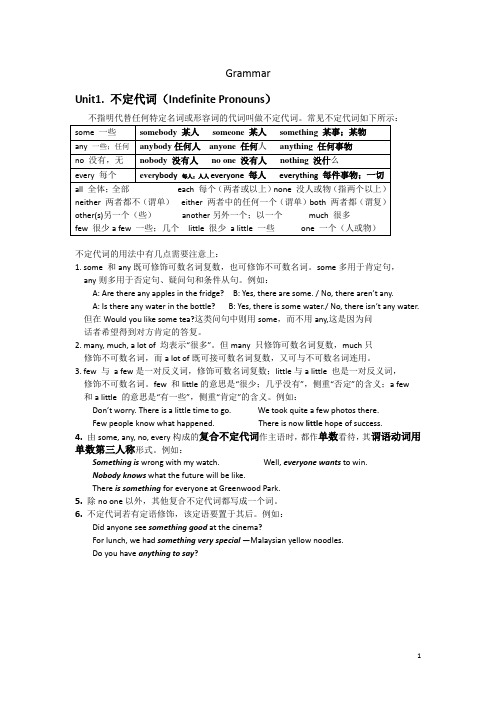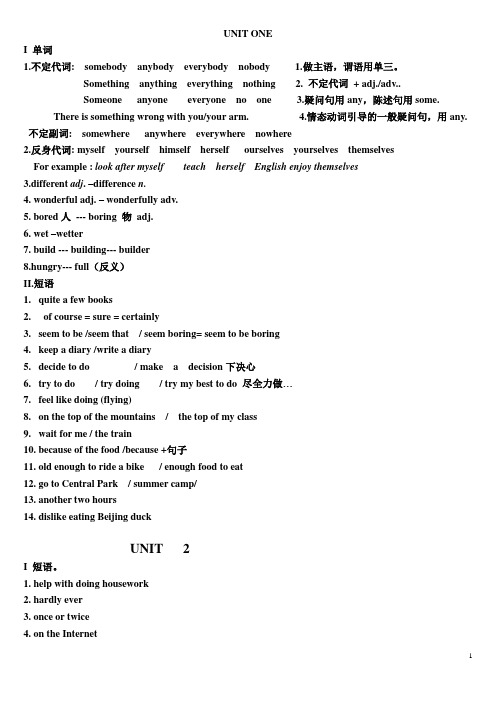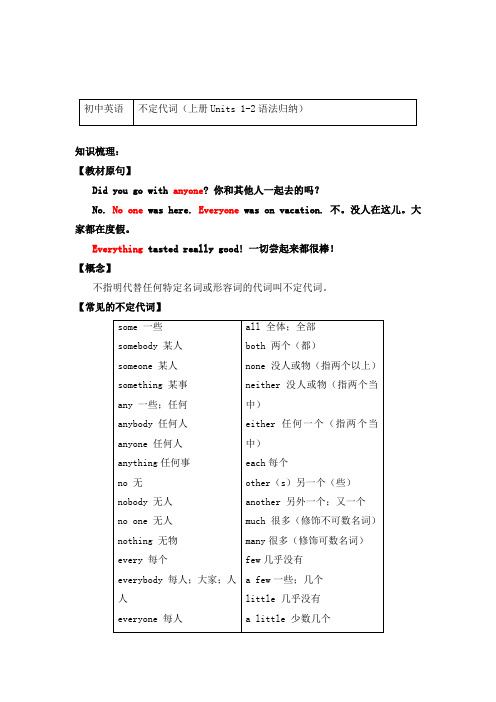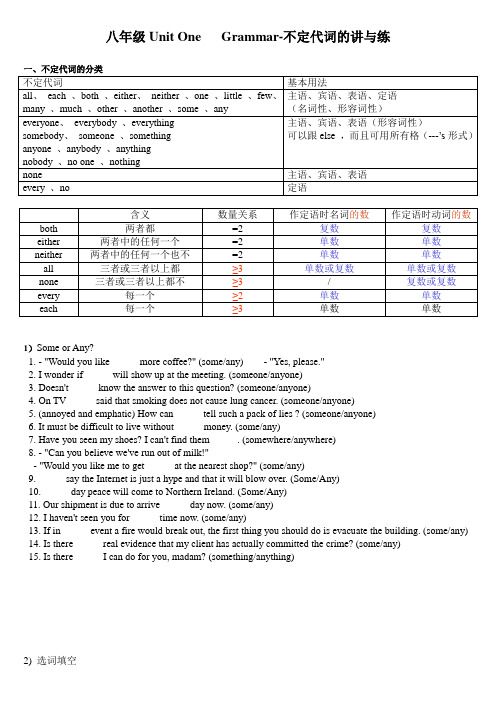八上不定代词
人教版英语八上语法知识篇

GrammarUnit1. 不定代词(Indefinite Pronouns)不定代词的用法中有几点需要注意上:1. some 和any既可修饰可数名词复数,也可修饰不可数名词。
some多用于肯定句,any则多用于否定句、疑问句和条件从句。
例如:A: Are there any apples in the fridge? B: Yes, there are some. / No, there aren’t any.A: Is there any water in the bottle? B: Yes, there is some water./ No, there isn’t any water.但在Would you like some tea?这类问句中则用some,而不用any,这是因为问话者希望得到对方肯定的答复。
2. many, much, a lot of 均表示“很多”。
但many 只修饰可数名词复数,much只修饰不可数名词,而a lot of既可接可数名词复数,又可与不可数名词连用。
3. few 与a few是一对反义词,修饰可数名词复数;little与a little 也是一对反义词,修饰不可数名词。
few 和little的意思是“很少;几乎没有”,侧重“否定”的含义;a few 和a little 的意思是“有一些”,侧重“肯定”的含义。
例如:Don’t worry. There is a little time to go. We took quite a few photos there.Few people know what happened. There is now little hope of success.4.由some, any, no, every构成的复合不定代词作主语时,都作单数看待,其谓语动词用单数第三人称形式。
例如:Something is wrong with my watch. Well, everyone wants to win.Nobody knows what the future will be like.There is something for everyone at Greenwood Park.5.除no one以外,其他复合不定代词都写成一个词。
八上 UNIT1-UNIT5笔记

UNIT ONEI 单词1.不定代词: somebody anybody everybody nobody 1.做主语,谓语用单三。
Something anything everything nothing 2. 不定代词+ adj./adv..Someone anyone everyone no one 3.疑问句用any,陈述句用some.There is something wrong with you/your arm. 4.情态动词引导的一般疑问句,用any. 不定副词: somewhere anywhere everywhere nowhere2.反身代词: myself yourself himself herself ourselves yourselves themselvesFor example : look after myself teach herself English enjoy themselves3.different adj. –difference n.4. wonderful adj. – wonderfully adv.5. bored人--- boring 物adj.6. wet –wetter7. build --- building--- builder8.hungry--- full(反义)II.短语1.quite a few books2.of course = sure = certainly3.seem to be /seem that / seem boring= seem to be boring4.keep a diary /write a diary5.decide to do / make a decision下决心6.try to do / try doing / try my best to do 尽全力做…7.feel like doing (flying)8.on the top of the mountains / the top of my class9.wait for me / the train10.because of the food /because +句子11.old enough to ride a bike / enough food to eat12.go to Central Park / summer camp/13.another two hours14.dislike eating Beijing duckUNIT 2I 短语。
新八年级上册英语不定代词

复合不定代词不指明代替任何特定名词或形容词的代词叫不定代词,它们有some, any, much, many等以及由every-, some-, any-, no-加上-thing, -body, -one构成的复合不定代词。
下面我们主要学习有关复合不定代词的内容。
一、复合不定代词的分类指物:everything, something, anything, nothing指人:everybody, somebody, anybody, nobodyeveryone, someone, anyone, no one二、复合不定代词的用法1. ◆some-类的复合不定代词一般用于肯定句中。
如:There is somebody at the door.◆any-类的复合不定代词一般用于否定句或疑问句中,表示“某事;某物;某人”;也可用于肯定句或条件从句中,表示“任何东西;任何人”。
如:There isn't anything in the box.Did you see anybody there?If anybody comes here, please ask him to wait.[注意]在一般疑问句中,当问话人希望得到对方的肯定回答时,用要some-类的复合不定代词;当问话人只是提出问题,而对回答的期待没有倾向性时,则用any-类的复合不定代词。
试比较:a. Do you have something to tell me?有事要告诉我吧?b. Do you have anything to tell me?有什么事要告诉我吗?句a表示说话人期望有事告诉他,而句b无此含义。
又如:a. Did somebody telephone last night?昨晚有人来电话了吧?b. Did anybody telephone last night?昨晚有人来过电话吗?句a意味着说话人期望或预料有人来过电话,而句b无此含义。
英语八年级上册知识讲义 不定代词(Units 1-2语法归纳)-人教新目标版

知识梳理:【教材原句】Did you go with anyone? 你和其他人一起去的吗?No. No one was here. Everyone was on vacation. 不。
没人在这儿。
大家都在度假。
Everything tasted really good! 一切尝起来都很棒!【概念】不指明代替任何特定名词或形容词的代词叫不定代词。
【常见的不定代词】everything 每件事;一切1. some系列的词主要用于肯定句中;any系列的词主要用于疑问句、否定句中。
它们都既可修饰可数名词,也可修饰不可数名词。
【例句】There is something wrong with her. 她生病了。
There isn’t anyone in the classroom. 教室里没有人。
提示:在Would you like sth.?一类的问句中用some,不用any。
2. 由some, any, no, every构成的复合不定代词作主语时,谓语动词用第三人称单数形式。
【例句】Everyone in China likes the Spring Festival. 在中国,人人都喜欢春节。
3. 形容词修饰不定代词时,通常放在不定代词的后面。
【例句】Please do something special. 请做些特别的事情吧。
4. 几组不定代词的区别:① both, either, neither这三个词都指两者,both表示“两者都”,either表示“两者中的任何一个”,neither表示“两者都不”。
【例句】—Which do you like better, tea or coffee? 你更喜欢哪个,茶还是咖啡?—Neither, I like water better. 两者都不,我更喜欢水。
② a few; few;a little; little★ a few, few用来修饰可数名词,a little, little用来修饰不可数名词。
八年级上学期英语所有必考知识点大汇总

八上英语所有必考知识点大汇总Unit1 Where did you go on vacation?【重点语法】不定代词:不指名代替任何特定名词或形容词的代词叫做不定代词。
用法注意:1. some 和any +可数名/不可数名。
some 多用于肯定句,any多用于否定句、疑问句和条件从句。
有些问句中用some,不用any, 问话者希望得到对方肯定回答。
2. 由some, any, no, every 与body, one, thing构成的复合不定代词作主语时,其谓语动词用三单。
3. 不定代词若有定语修饰,该定语要置于其后:如:something interesting【重点短语】1. buy sth for ab./ buy sb. sth 为某人买某物2. taste + adj. 尝起来……3. nothing...but + V.(原形) 除了……之外什么都没有4. seem + (to be) + adj 看起来5. arrive in + 大地方/ arrive at + 小地方到达某地6. decide to do sth. 决定做某事7. try doing sth. 尝试做某事/ try to do sth. 尽力做某事8. enjoy doing sth. 喜欢做某事9. want to do sth. 想去做某事10. start doing sth. 开始做某事=begin doing sth.11. stop doing sth. 停止做某事区分:stop to do sth. 停下来去做某事12. dislike doing sth. 不喜欢做某事14. so + adj + that + 从句如此……以至于……16. tell sb. (not) to do sth. 告诉某人(不要)做某事17. keep doing sth. 继续做某事18. forget to do sth. 忘记去做某事/ forget doing sth 忘记做过某事【词语辨析】1. take a photo/ take photos 拍照quite a few+名词复数“许多…”2. seem + 形容词看起来…... You seem happy today.seem + to do sth. 似乎/好像做某事 I seem to have a coldIt seems + 从句似乎..…. It seems that no one believe you.seem like ... 好像,似乎….. It seems like a good idea.3. arrive in +大地点= get to= reach+地点名“到达......”arrive at +小地点(注:若后跟地点副词here/there/home, 介词需省略,如:arrive here; get home)4. feel like sth 感觉像…feel doing sth. 想要做某事5. wonder(想知道)+疑问词(who, what, why)引导的从句。
人教版英语八年级上册Unit1 语法透析—不定代词

Unit1 语法透析—不定代词不指名代词任何特定名词或形容词的代词叫作不定代词。
不定代词可以起名词或形容词的作用,没有主格和宾格之分,在句中可作主语、宾语、表语、定于等。
常见的不定代词如下所示:1. one, some与any:1) one可以泛指任何人,也可特指,还可指上文中出现的同类事物,要区别于i t,复数为ones。
some多用于肯定句,any多用于疑问句和否认句。
One should learn to think of others. Do you have a ruler? No, I don’t have one.Do you have any bookmarks? No, I don’t have any.I have some questions to ask.2) some可用于疑问句中,表示盼望得到肯定的答复,或者表示建议,请求等。
Would you like some bananas? Could you give me some money?3) some 和any可修饰名词,要注意单复数。
修饰可数名词单数时,some表示某个,any表示任何一个。
I have read this article in some magazine. Any student can solve this problem.4) some和数词连用表示“大约〞,any可与比拟级连用表示程度。
There are some 3,000 students in this school. Do you feel any better today?2. each和every:each强调个别,代表的数可以是两个或两个以上,而every强调整体,所指的数必须是三个或三个以上。
Each student has a pocket dictionary. / Each (of us) has a dictionary. / We ea ch have a dictionary.Every student has strong and weak points. / Every one of us has strong and weak points.3. none和no:no等于not any,作定语。
新目标人教版八年级上Unit1不定代词的用法(51张)

2) Neither (of us) is a doctor. 我们俩都 不是医生。 3) Either (of you) will go. 随你们哪个去 都可以。
注意:作主语时,both后面的谓语动 词用复数。neither, either后面的谓语动 词一般用单数形式。
作定语: 1 ) Both Zhang Hua's father and mother work in a hospital, but neither one is a doctor.
each / every,
many / much
不定代 词
含义
数量关系
作定语时 名词的数
作主语时动 词的数
both 两者都
=2
either
两者中的 任何一个
=2
neith 两者都不 er
=2
复数 单数 单数
复数 单数 单数
all
三者或三者以 上都
≥3
单数 或复
数
单数或复数
none
三者或三者以 上Байду номын сангаас不
不定代词的用法
八年级英语
不定代词有both, either, neither, one, the other, another, little, few, some, any, each, every, no, none等,从实际应用和理解 出发,重点学习以下几个:
(一) both, either, neither (二) one, another, the other (三) little, a little, few, a few (四) some / any, no / none,
This is not mine. That is not, either. 这不是我的,那也不是。
不定代词知识点八年级上

不定代词知识点八年级上不定代词是英语中一个非常重要的语法点,是指代替未知或不确定对象或人的词语。
八年级上册学生已经开始学习不定代词的基础知识,本文将进一步讲解不定代词的各种形式和用法。
1. 不定代词的种类不定代词可以分为三类:代替不定数量的不定代词,代替一个人或物的不定代词,和代替一个确定的人或物的不定代词。
1.1 代替不定数量的不定代词这类不定代词通常用于表示存在多少个人或物是未知的,它们包括:some, any, no, every, many, few, several, all, both, neither, either等。
1.2 代替一个人或物的不定代词这类不定代词通常用于表示一个未知的人或物,它们包括:someone, anybody/anyone, nobody/no one, everybody/everyone, something, anything, nothing等。
1.3 代替一个确定的人或物的不定代词这类不定代词通常用于表示一个已知的人或物,它们包括:one, ones, the one等。
2. 不定代词的用法2.1 代替人或物不定代词可以用于代替人或物,例如:I need someone to help me with my homework.(我需要有人来帮我做作业。
)Did you see anything strange?(你看到了什么奇怪的吗?)2.2 修饰名词不定代词也可以用于修饰名词,例如:Do you have any interesting books?(你有什么有趣的书吗?)2.3 放在句首不定代词有时可以放在句首,表示强调或对比,例如:Some people think that money is the most important thing in life. Others disagree.(有些人认为金钱是生命中最重要的东西,而另一些人则不同意。
八年级不定代词和不定副词

不定代词和不定副词:(一) 不定代词:指人:someone/ somebody anyone/ anybody no one/ nobody everyone/everybody指物:something anything nothing everything(二)不定副词指地点:somewhere anywhere nowhere everywhere(三)用法:1.some-复合代词/副词常用于肯定句;如:I saw someone in the room. 我看见房间里有人。
There is something in the woods. 树林里有什么东西。
He has gone somewhere warm for his holiday. 他去暖和的地方度假了。
2.any-复合代词/副词常用于否定句或疑问句;如:I didn’t see anyone in the room. 我没看见有人在房间里。
There isn’t anything in the woods. 树林里没有什么东西。
He hasn’t gone somewhere warm for his holiday.他没去暖和的地方度假。
3.no- 复合代词/副词表全否定;如:I saw nobody in the room. 我看见房间里没有人。
There is nothing in the woods. 树林里没有什么东西。
4.every- 复合代词/副词代替全部;如:Everyone is here. 大家都在这儿。
It seems he knows everything. 似乎他知道一切。
※some-复合代词/副词用于疑问句中时,表希望得到对方的肯定回答或表请求;如:Would you like something to drink? 你要点喝的东西吗?※any-复合代词/副词用于肯定句时,表“任何”;如:If people spit anywhere in public, they should be punished.如果人们在公众的任何地方吐痰,他们应该受罚。
八年级初中英语语法不定代词

指人 everybody somebody anybody nobody
指物 everything something anything nothing
the others: 另一些,one…, the others…
another: 任意的另一个, I’d like another cup of tea.
I’ll ask you another two questions.
11. 复合不定代词
指人 everyone someone anyone no one
不定代词的用法:
1, one: 单数名词, I haven’t a pen. Can you lend me one?
ones: 复数名词, I prefers red roses to yellow ones.
复数名词, All the books are his. 2, all: 不可数名词, All the money is mine.
3, every: 强调整体性, 形容词性,不能跟”of ”,后加名词。 Every boy is bright.
each:强调个别性,可以加“of ”, Each of them has a book.
4, no: 没有,形容 I have no money./ No oof the books is interesting.
6, little: 几乎一点没有,加不可数名词 a little: 少量,加不可数名词
7, few:
几乎一个没有,加可数名词
少数,加可数名词
a few:
8, some: “一些”可加复数名词和不可数名词,用于 肯定句和建议性问句 any: “一些”,可加复数名词和不可数名词,用于否 定句和疑问句
八年级英语上册Unit One 不定代词(语法讲解)深圳牛津版

Unit1:不定代词不定代词不指明代替任何特定名词或形容词的代词,在句中可作主语、表语、宾语和定语。
Ⅰ.不定代词包括:all , both, every, each, either, neither, more,(a) little, (a) few, much, many, another, other, some, any , one以及some, something, anything, everything, somebody, someone, anybody, anyone, nothing , nobody,no one, none, everybody, everyone.等。
一般来讲,修饰不定代词的词要置于其后。
Ⅱ,不定代词用法为:不定代词+(of + 限定词)+ 名词注意:of 后一定要有限定词both, all可以直接接限定词theⅢ.几组常用不定代词的区别:1.代词比较one,that 和itone表示泛指,指名称相同的另一物,或所提到的人或物中的一个。
that和it 表示特指。
that与所指名词为同类,但不是同一个,而it 与所指名词为同一个。
I can't find my hat. I think I must buy one.第1页The hat you bought is bigger than that I bought.I can't find my hat. I don' t know where I put it.2. some与any的区别1)some多用于肯定句,表示“一些,几个”作形容词时,后面可以接①不可数名词+单数动词;②可数名词+复数动词。
Look! Some of the students are cleaning the library.Some rice in the bag has been sold out.2)any多用于疑问句、条件句和否定句中,表示“一些,任何”用作形容词时,后面可以接①不可数名词+单数动词;②可数名词+复数动词。
八年级上册 Unit 1 Encyclopaedias Grammar-不定代词

八年级Unit One Grammar-不定代词的讲与练一、不定代词的分类不定代词基本用法all、each 、both 、either、neither 、one 、little 、few、many 、much 、other 、another 、some 、any 主语、宾语、表语、定语(名词性、形容词性)everyone、everybody 、everything somebody、someone 、something anyone 、anybody 、anything nobody 、no one 、nothing 主语、宾语、表语(形容词性)可以跟else ,而且可用所有格(---’s形式)none 主语、宾语、表语every 、no 定语含义数量关系作定语时名词的数作定语时动词的数both 两者都=2 复数复数either 两者中的任何一个=2 单数单数neither 两者中的任何一个也不=2 单数单数all 三者或三者以上都≥3单数或复数单数或复数none 三者或三者以上都不≥3/ 复数或复数every 每一个≥2单数单数each 每一个≥3单数单数1)Some or Any?1. - "Would you like _____ more coffee?" (some/any) - "Yes, please."2. I wonder if _____ will show up at the meeting. (someone/anyone)3. Doesn't _____ know the answer to this question? (someone/anyone)4. On TV _____ said that smoking does not cause lung cancer. (someone/anyone)5. (annoyed and emphatic) How can _____ tell such a pack of lies ? (someone/anyone)6. It must be difficult to live without _____ money. (some/any)7. Have you seen my shoes? I can't find them _____. (somewhere/anywhere)8. - "Can you believe we've run out of milk!"- "Would you like me to get _____ at the nearest shop?" (some/any)9. _____ say the Internet is just a hype and that it will blow over. (Some/Any)10. _____ day peace will come to Northern Ireland. (Some/Any)11. Our shipment is due to arrive _____ day now. (some/any)12. I haven't seen you for _____ time now. (some/any)13. If in _____ event a fire would break out, the first thing you should do is evacuate the building. (some/any)14. Is there _____ real evidence that my client has actually committed the crime? (some/any)15. Is there _____ I can do for you, madam? (something/anything)2) 选词填空I was walking home from school. I was alone. ________(Somebody/Anybody/Nobody) was with me. It was very dark. Suddenly, there was a yellow light. ________(Something/Anything/Nothing) landed in front of me. It was a spaceship! ________(Somebody/Anybody/Nobody) spoke, but I didn’t understand him. I didn’t see ________(somebody/anybody/nobody). I was terrified(恐惧), so I ran back home. When I got home, I took off mu jacket. Then I saw ________(something/anything/nothing) strange on the back. It was a message! It said, “Meet us-same day, same time, same place, next week.”3)用下列单词填空anybody/anyone somebody/someone nobody/no one something nothing anything1.I’m thirsty! I’d like ________ to drink.2.We’re bored. There isn’t ________ interesting to do.3.John called his friend Jack, but he went out. ________ answered the phone.4.________ just rang the bell. I’ll answer the door,5.I noticed that ________ was missing as soon as I walked into my bedroom.6.How strange! There is ________in the street.7.Our teacher gave us ________ difficult to do for homework. It is a Maths problem.8.We should buy some food. There is ________ in the kitchen cupboards.9.We don’t have ________ to eat at home. Let’s go to a restaurant.10.Does ________ want to see a film with me tonight?4)其他不定代词用法(拓展)A.another, other, others, the other, the others1. I only found Jim and Tom there. Where are____?2.Of these three girls one comes from China and______two come from Japan.3.This sweater is a little too big for me. Can I try on(试穿)?4.Some like black tea,_____prefer(偏爱) green tea.5.I don’t like these colors. Show me some_____ , please.6.Have you any____books on this subject?7. Saying is one thing and doing is_______.8. It is always hard to tell the twins one from______.B.neither, none, either1.I know_____of the two students.3.He doesn’t agree with_____of his parents on many things.D.one, the one, ones, one’s1.These shirts are too small. I want to have some bigger______.2.Which boy is your son?—_____in a red cap.3._____has to do_____best.4.I have only one small flower on my desk and she has three big______.。
八年级第一单元不定代词的用法

三单形式
Someone is singing in the next room. Everyone is here. 6. 形容词修饰不定代词/副词时需将形容词后置。 I have something interesting to tell you. Is there anything important in today's newspaper ?
2. Please keep quiet, everyone! I have ____to tell you. A. important anything B. anything important C. something important
3. There is ____ with my computer. Can you help me mend it?
A. nothing wrong B. wrong anything C. something wrong.
Did you do anything interesting ? 2. some型不定代词有时用于疑问句中表示委
婉地请求 Would you like something to drink ? 特殊 any型不定代词用于肯定句中表示“任何”
Anyone can do it.
3. nothing, no one 均表示否定意义。 There's nothing interseting in today's newspaper. No one can do it better.
6. -Do you have _a_n_y_th_i_n_g_to say for yourself? - No, I have _n_o_t_h_in_g__ to say.
不定代词知识点八年级

不定代词知识点八年级不定代词是英语语法中一个比较重要的知识点。
在八年级英语课程中,不定代词被认为是比较难掌握的知识之一。
因此,我们需要对不定代词的相关知识点进行深入地了解和掌握。
一、不定代词的基本概念不定代词是指用来代替某些未被具体确定的人、物、事物的代词。
例如,“someone”、“something”、“somewhere”等。
二、不定代词的分类不定代词可以分成两大类,即不定代词和复合不定代词。
其中,不定代词只有一个词,而复合不定代词由两个或更多的词组成。
1. 不定代词不定代词可以分成以下五类:①肯定不定代词:用来指代肯定的人、事、物,包括“someone”、“something”、“somewhere”、“anyone”、“anything”、“anywhere”等。
例: There must be someone who can help us.②否定不定代词:用来指代否定的人、事、物,包括“nobody”、“nothing”、“nowhere”、“none”、“neither”等。
例: There is nobody in the room.③疑问不定代词:用来表示疑问的人、事、物,包括“who”、“what”、“which”、“where”等。
例: Who is the man in the corner?④“one”不定代词:用来指代特定的事物,也可以用来和数字搭配使用,表示数量。
例: I want to buy one book.⑤“some”不定代词:用来表示肯定的人、事、物,也可以用来表示请求和建议。
例1: Can you give me some water?例2: Why don't you read some books?2. 复合不定代词复合不定代词由两个或更多词组成。
常见的有“anybody else”、“somebody else”、“everybody else”、“something else”等。
八年级上册不定代词的用法总结

稿子一嗨,亲爱的小伙伴们!今天咱们来聊聊八年级上册那些有趣的不定代词呀!先说“some”和“any”,这俩可是很常见的。
“some”一般用在肯定句里,比如“There are some apples on the table.” 意思就是桌上有一些苹果。
而“any”呢,大多出现在否定句和疑问句中,像“I don't have any money.” 还有“Do you have any books?” 是不是很好理解呀?然后是“many”和“much”。
“many”用来修饰可数名词复数,“much”就用来修饰不可数名词啦。
比如说“Many students are in the classroom.” 这里的“students”是可数的,所以用“many”。
再比如“There is much water in the bottle.” 水是不可数的,就得用“much”。
“a few”和“few”,“a little”和“little”也得好好说道说道。
“a few”和“a little”都表示“有一些”,不过“a few”是修饰可数名词,“a little”是修饰不可数名词。
而“few”和“little”则表示“几乎没有”,“few”修饰可数,“little”修饰不可数。
像“I have a few friends.” 说明我有几个朋友。
“I have few friends.” 那可就惨啦,意思是我几乎没朋友。
还有“one”,它可以指人也可以指物,比如“One of the girls is my sister.” 是不是还挺好用的?哎呀,不定代词的用法可真不少,不过多练习练习就没问题啦!稿子二嘿,小伙伴们!咱们又见面啦,今天来唠唠八年级上册的不定代词哟!“either”和“neither”也很有意思。
“either”表示“两者中的任何一个”,“Neither”则表示“两者都不”。
比如说“Either of the books is good.” 还有“Neither of them likes sports.” 是不是挺清晰的?还有“each”和“every”。
八年级不定代词知识点归纳总结

八年级不定代词知识点归纳总结不定代词是指在句子中作代词,但没有明确的指代对象的词语。
在日常英语中,不定代词被广泛使用,它们能够替代名词,起到简化句子结构的作用。
以下是八年级学生需要了解的常见不定代词知识点的归纳总结。
1. 定义和用法不定代词是没有特指对象的代词,它们可以单独使用,而不需要特定的名词前置。
一些常见的不定代词有:someone, anybody, nobody, everybody, something, anything, nothing, everything 等。
它们在句子中起到替代名词的作用。
2. 不定代词的形式不定代词通常用作主语、宾语和表语。
它们的形式一般为单数形式。
例如:- Somebody called me while you were out. (someone作主语)- He didn't find anything in the drawer. (anything作宾语)- Is everyone here? (everyone作表语)3. 不定代词的区别和用法- Anybody/anyone: 表示任何人,常用于问句或否定句中。
- Did anybody see my wallet?- I don't think anyone can solve this problem.- Somebody/someone: 表示某人,用于肯定句。
- Somebody left their jacket in the classroom.- Nobody/no one: 表示没有人,用于否定句。
- Nobody wants to go to the party.- Everybody/everyone: 表示每个人,用于肯定句。
- Everyone is excited about the field trip tomorrow.4. 不定代词与“every”和“some”连用- Everybody/everyone: 指所有人,强调集体整体。
八年级上册英语期末知识点巩固:不定代词和不定副词

八年级上册英语期末知识点巩固:不定代词
和不定副词
(1)左边的some、any、every、no与右边的body、one、thing构成不定代词,some、any、every、no与右边的疑问副词where构成不定副词;
(2)一般情况下以some开头的不定代词和不定副词用于肯定句,以any开头的不定代词和不定副词用于否定句、疑问句;以no开头的不定代词和不定副词表示否定含义(no one为两个单词);
(3)不定代词或不定副词和形容词连用时,形容词放在后面。
He has something important to do.他有重要的事情要做。
(肯定句用something,形容词important放后) Did you buy anything special? (一般疑问句用anything,形容词special放后)
Did you go anywhere interesting last month?上个月你去令人感兴趣的地方了吗?
(一般疑问句用不定副词anywhere,形容词interesting 放后)
(4)不定代词和不定副词做主语时,后面的动词用单数
形式。
Everone is here today.今天每个人都在这里。
以上就是为大家整理的八年级上册英语期末知识点巩固:不定代词和不定副词,怎么样,大家还满意吗?希望对大家的学习有所帮助,同时也祝大家学习进步,考试顺利!
相关标签搜索:八年级英语期末试卷。
八年级不定代词

INDEFINITE PRONOUNS
2/12
There isn’t __________ interesting to do here.
anything
NEXT
3/12
Click on the right can
Does __________ here play football?
anybody
NEXT
4/12
Click on the right can
(1)复合不定代词在句中充当主语、宾语、表语;做主语时,谓语动词用单数。Everything begins to grow when spring comes.(作主语)Everybody is here except Tom.(作主语)
(2)形容词修饰不定代词要后置。There is nothing wrong with my car.The government is doing something useful to protect the environment.
复合不定代词+形容词
(3)带some的复合不定代词常用于肯定句中; 带any的复合不定代词常用于否定句或疑问句中。 Someone called her last week. 某个人上周给她打电话了。 I'd like something to eat. 我想要一些吃的。
There isn’t anyone else there. 那没有 人。
人教版英语八上Unit 1语法:不定代词

Did you see anything interesting/special?
Did you meet anyone interesting?
Did you go anywhere interesting?
八上 Unit 1语法 不定代词
不定代词:某人,某物,某地
不定代词 some-
any-
every-
no-
somebody anybody everybody nobody 某人 someone anyone everyone no one
某物 something anything everything nothing
to the supermarket and buy some.
A. little B. a little C. few D. a few
(A ) 8. There are only _____ students in the classroom.
WheHale Waihona Puke e are the others?
A. a few B. few C. a little D. little
I have something important/ new to tell you. 3. 不定代词+ to do
something to eat 吃的东西 something to drink 喝的东西
4. few, a few, little, a little
few, little: 几乎没有, 没有(表否定)
few, a few, little, a little专项练习
- 1、下载文档前请自行甄别文档内容的完整性,平台不提供额外的编辑、内容补充、找答案等附加服务。
- 2、"仅部分预览"的文档,不可在线预览部分如存在完整性等问题,可反馈申请退款(可完整预览的文档不适用该条件!)。
- 3、如文档侵犯您的权益,请联系客服反馈,我们会尽快为您处理(人工客服工作时间:9:00-18:30)。
八年级上Unit 1
一复合不定代词
【教材典句】
1.-- Did you go out with anyone? 你和别人一起出去了吗?
-- No. No one was here. Everyone was on vacation. 不,没有人在这儿。
大家都在度假。
2.-- Did everyone have a good time? 每个人都玩得很开心吗?
-- Oh, yes. Everything was excellent. 哦,是的。
一切都很好。
【语法全解】
1.构成:由some-,any-,every-,no-加上-one,-body,-thing构成的不定代词称为复合不定代词。
具体见下表:
-one -body -thing some- someone somebody something
any- anyone anybody anything
every- everyone everybody everything
no- no one nobody nothing
2.用法:
(1)复合不定代词相当于名词,在句中可以作主语、宾语和表语,但不能作定语There is someone outside the door. 门外有人。
I don’t have anything to say today. 我今天没什么可说的。
Is there anyone in the room? 房间里有人吗?
(2)复合不定代词被形容词、动词不定式等修饰时,形容词和动词不定式等应置于其后
I have something important to tell you. 我有重要的事情要告诉你。
Do you want anything to drink? 你想喝点什么吗?
There is nothing wrong with the radio. 这个收音机没有毛病。
(3)复合不定代词表示单数概念,作主语时,谓语动词用单数形式
Everything begins to grow in spring. 春天万物开始生长。
Someone is waiting for you at the door. 有人在门口等你。
(4)some-不定代词,通常用于肯定句中;any-不定代词则多用于否定句、疑问句中。
但在表示请求、建议、反问等的疑问句中,问话者希望得到肯定答复时,常用含有some-的不定代词,如something,somebody,someone等
Will you ask someone to carry the box for me? 你找人替我扛这箱子好吗?
Would you like something to eat? 你想要些吃的东西吗?
(5)anyone,anything也可用在肯定句中,表示“任何人,任何事”
Anyone can do this. 任何人都会做这个。
I can do anything for you. 我能为你做任何事。
【语法专练】
1.-- Have you read today’s newspaper?
-- Yes, but there isn’t .
A. new something
B. something new
C. new anything
D. anything new
2.A smile costs , but gives so much.
A. something
B. anything
C. nothing
D. everything
二 一般过去时的规则动词与不规则动词
【教材典句】
1. We took quite a few photos there. 我们在那里拍了不少照片。
2. I just stayed at home... 我只是待在家里...
3. ...I bought something for my father.... ...我为我爸买了一些东西。
4. ... So we decided to go to the beach... ...因此我们决定去海滩...
【语法全解】
英语中的动词按其过去式的构成方式可分为规则动词和不规则动词。
规则动词的过去式由词尾加-ed 构成,而不规则动词的变化因词而异。
1. 规则动词过去式的构成和发音
一般的动词 直接加-ed
watch-watched help-helped work-worked 读音规则注意:清辅音后读/t/;浊辅音和元音后读/d/;辅音/t/与/d/都读/id/
以字母e 结尾的规则动词 只加-d
love-loved live-lived arrive-arrived
以辅音字母加y 结尾的动
词
变y 为i ,再加-ed study-studied
cry-cried
worry-worried 重读闭音节结尾的动词,末尾只有一个辅音字母 先双写这个辅音字母,再加-ed shop-shopped stop-stopped
2. 不规则动词的过去式的变化各异,需要特殊记忆,每个不规则动词的变换形式,都必须牢记。
不规则动词的过去式变化没有统一的规则,但并非一点规律都没有,下面我们就介绍一部分动词过去式的记忆规律。
(1)动词的过去式与动词原形一样 let-let put-put read-read cut-cut (2)遇见i 改为a
swim-swam sing-sang begin-began sit-sat give-gave drink-drank
(3)过去式以ought 和aught 结尾的单词
bring-brought buy-bought think-thought catch-caught teach-taught (4)中间去e 末尾加t
feel-felt keep-kept sleep-slept sweep-swept meet-met feed-fed (5)把i 变为o
游泳(swim )唱歌(sing )后,开始(begin )坐(sit )下来,给(give )点喝(drink )的吧,i 就变成a
规则动词过去式的构成
过去式构成有规律,一般词尾加-ed 。
如若词尾有个e ,直接加-d 就可以。
辅音字母y 结尾,变y 为i 加-ed 。
一辅重闭作尾巴,双写之后加-ed 。
ride-rode drive-drove write-wrote
(6)ow/aw变为ew
know-knew grow-grew throw-threw draw-drew
(7)以d结尾的词,把d变成t
build-built lend-lent send-sent spend-spent
【语法专练】
1.I have been to Shanghai. I there last month.
A. go
B. went
C. have gone
D. will go
2.Tony football every weekend when he was young.
A. plays
B. played
C. is playing
D. has played
3.-- Do you have to say for yourself?
-- No, I have to say.
A. something; everything
B. nothing; something
C. everything; anything
D. anything; nothing
4.-- Would you like to eat?
-- Thanks, please.
A. something
B. anything
C. some things
D. any things
5.Paul and I tennis yesterday. He did much better than I.
A. play
B. will play
C. played
D. are playing
6.-- What did Mr. Smith do before he came to China?
-- He in a car factory.
A. worked
B. works
C. is working
D. will work
7.He went into his room and to work.
A. begins
B. began
C. beginning
D. to begin。
